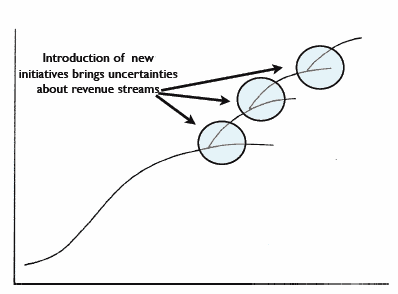

 In my last post I wrote about the uncertainty surrounding the thinking about whether or not companies should engage in the practice of giving guidance to investors. Of course what it boils down to is a careful examination of the factors surrounding each company’s situation. And while this sounds like a bunch of waffle language coming from a cautious lawyer, I believe there are some general guidelines that can help companies think through the process.
In my last post I wrote about the uncertainty surrounding the thinking about whether or not companies should engage in the practice of giving guidance to investors. Of course what it boils down to is a careful examination of the factors surrounding each company’s situation. And while this sounds like a bunch of waffle language coming from a cautious lawyer, I believe there are some general guidelines that can help companies think through the process.
Here then are reasons a company should consider giving guidance to investors:
- You are a small cap company and have low sell side analyst coverage. One of the big issues for small cap stocks is simply getting on the radar screen of analysts and getting coverage. Anything a company can do to improve their chance of coverage (read: make life easier for the analyst), including issuing guidance, should come into play in order to gain the increased trading volumes, liquidity and visibility that come with increased sell side coverage.
- You are in a predictable business with good insight into near term revenues and profits. Companies with recurring revenue streams or large backlogs of orders to be fulfilled in the near future are an example here.
- You are in a predictable industry that is not prone to large swings due to economic factors or trends where virtually everyone else issues guidance and you would stand out like a sore thumb if you did not also give guidance.
- You don’t want to give continuous updates on your business in between quarters. The more transparent you can be on a continuing basis, the less you need to help the street by giving guidance.
- Management has the intestinal fortitude to run the business to plan and not manage the earning to hit guidance. Accounting is full of subjective judgments and timing issues. It is possible to move revenues into the current quarter or fiddle with loss reserves to make earnings look better in the quarter so you hit your guidance. This is almost never a good thing, but the pressure to “hit the numbers” can be overwhelming at times. Don’t issue guidance if it is going to warp the way you run your business.
- You recognize that occasionally you will be wrong with your guidance and are willing to make the necessary corrective announcements.
- You figure that the market is going to make a forecast anyway, so why not take control of the process.
On the other hand a company is not a good candidate to issue guidance under the following circumstances:
- Don’t give guidance if you are in an unpredictable business. This should be obvious, but you see it all the time. For example, property and casualty insurance companies are in the business of underwriting uncertain risks. They don’t know when the next natural disaster will wreak havoc with their earnings, so it makes no sense for them to be giving guidance on earnings.
- Don’t give guidance if you are not very good at it. If your company has given guidance in the past, but you find that you have to constantly revise the numbers downward, or you are wrong more than you are right, guidance is more trouble than it’s worth. Find a better solution.
- Don’t give guidance if it will cause management to engage is short-term practices that are not in the best long-term interests of the company. Jiggling things around to “hit the numbers” is a slippery slope at best and the road to perdition at worst.
In my next post I will talk a bit about alternatives to guidance a company can give.





